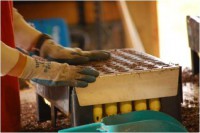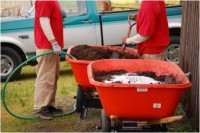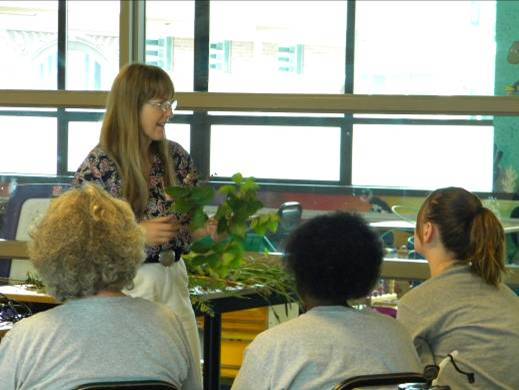Working With Offenders at Shotwell’s Landing Nursery
By Graduate Research Assistant Jaal Mann
When most people imagine offenders in a prison work crew, they probably see surly, unmotivated folks who don’t want to be there and may even be frightening. This couldn’t be farther from the truth.
Prison work crews make a large part of our conservation nursery work possible. They assist with everything, from cleaning and sanitizing used cells to sowing seeds and weeding germinating plants. Most offenders participating at Shotwell’s Landing nursery are highly motivated and want to learn. They are excited when they hear how their work is going to help conserve endangered prairie species, and it really seems to make them feel more connected to the world outside of prison. “I’d come out here every day if I could,” said one inmate as he prepared the lower hoop house for new seedlings that they would sow a few weeks later.
Many of these offenders are already highly knowledgeable about biology and horticulture. They are able to offer valuable input on nursery methods and are often pleased to contribute ideas to make the nursery run more smoothly. They take pride in their work, and most of the offenders truly appreciate when we describe its ecological context; they want to understand the impacts of their labor and see how it fits in to the bigger picture of conservation. In general, they are much more open-minded than many non-incarcerated people.
After a couple of hours working with offenders, people realize that while certain rules must be observed, working with prisoners isn’t such a frightening experience. The inmates are excited to work hard to help make a difference.
All photos by Jaal Mann.







 Gig Harbor, Wash.—Emphasizing the importance of sustainability, the horticulture program at
Gig Harbor, Wash.—Emphasizing the importance of sustainability, the horticulture program at  “Because each offender demonstrated a high capacity of responsibility for day-to-day farm activities, I decided to assign special projects for each lady,” Little said. “The project idea was a way for the offenders to take ownership of the farm, learn something new and educate each other on their respective projects. Being a part of the learning process was an enriching experience as a manager, and I look forward to working with Washington Corrections Center for Women to explore new boundaries, build knowledge and experiences and work together to fight hunger.”
“Because each offender demonstrated a high capacity of responsibility for day-to-day farm activities, I decided to assign special projects for each lady,” Little said. “The project idea was a way for the offenders to take ownership of the farm, learn something new and educate each other on their respective projects. Being a part of the learning process was an enriching experience as a manager, and I look forward to working with Washington Corrections Center for Women to explore new boundaries, build knowledge and experiences and work together to fight hunger.”





